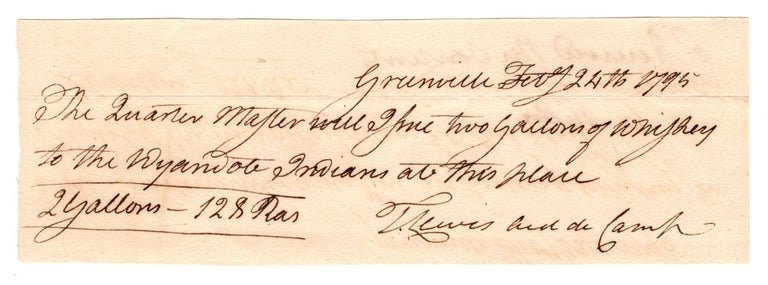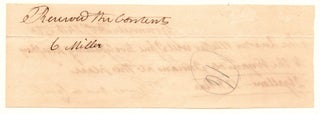“The Quarter Master will give two gallons of Whiskey to the Wyandote Indians at this place…”
Greenville, [Ohio Territory], 24 February 1795. Manuscript document, 2.5” x 7.6”. 1 p., with note on verso. CONDITION: Very good, .5” tear along old fold, no losses to the text. A fascinating document recording the sale of whiskey to the Wyandotte, bearing the name of Christopher Miller, who was captured by Native Americans as a child and lived among them for many years, then rejoined the white community and fought in the Northwest Indian War. This document reads in full: “Greenville Feby 24th 1795. The Quarter Master will give two gallons of whiskey to the Wyandote Indians at this place. 2 gallons—128 Ra[tion]s[?]. T[homas] Lewis, Aide de Camp. [Verso:] Reserved the contents. C[hristopher] Miller.” Captain Thomas Lewis served in the 3rd U.S. Regiment and as Aide de Camp to General Anthony Wayne (1745–1796). After serving in the Revolutionary War, Wayne settled in Georgia and briefly represented Georgia in the U.S. House of Representatives. He returned to the Army to accept command of U.S. forces in the Northwest Indian War, where he defeated the Northwestern Confederacy, an alliance of Native American aided by the British. Following the 1794 Battle of Fallen Timbers and a scorched earth campaign of destroying villages, Wayne negotiated the Treaty of Greenville on 3 August 1795, which ended the war. His victory during the Northwest Indian War resulted in the removal of Native Americans from the Ohio Valley, and paved the way for future westward expansion. The annotation on the verso is likely a reference to Christopher Miller, who was captured, along with his older brother Henry Miller, by Native Americans when they were young and were adopted by an Indian family. Henry lived among Native Americans until he was about twenty-four years old, having around that age begun thinking of returning to his white relatives, despite having adopted Native Americans manners and customs. Henry related his intention to his brother and unsuccessfully attempted to persuade Christopher to accompany him in his flight. Christopher was young when he was captured and was now a good hunter, an expert woodsman, and thus a free and independent Native American. Henry set off alone through the woods and arrived safely among his friends in Kentucky. Christopher was later captured by white soldiers and was placed in a guard house where Gen. Anthony Wayne frequently interrogated him as to what he knew of the future intentions of the Native Americans. Captain William Wells (1770–1812) and Henry frequently visited Christopher in the guard house, urging him to leave the Indians and to join the whites. While initially reserved, Christopher later became more cheerful and agreed that if released he would remain with the whites. Capt. Wells and Henry Miller solicited Gen. Wayne for Christopher’s liberty, who ordered Christopher to be set at liberty. Christopher was freed and joined the company with Capt. Wells and his brother, fighting against the Native Americans during the rest of the Northwest Indian War (1786–95). The document is entirely in Lewis’s hand. Presumably, Christopher was illiterate owing to the fact that he was raised among Native Americans. Christopher may be the Quartermaster that Lewis refers to in the document. A remarkable survival of the Northwest Indian War. REFERENCES: Biographical Sketches of General Nathaniel Massie, General Duncan McArthur, Captain William Wells, and General Simon Kenton (Dayton, Ohio: D. Osborn & Son, 1852), pp. 183–191.
Item #7833
Price: $850.00



